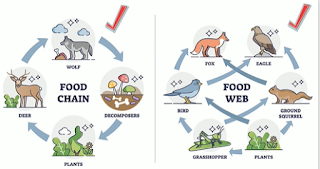All living things need energy.
Some living factors also called biotic factors get their energy from the sun. Others get their energy by eating other biotic factors and some living things like decomposers break down once living things and recycle nutrients.
As a result, energy is always flowing in an ecosystem.
For most ecosystems, the ultimate energy source is the sun
However there are some organisms that get their energy from reactions involving inorganic chemicals, and typically in the absence of sunlight.This is called chemosynthesis
Producers which use photosynthesis or chemosynthesis to create their energy are a major source of energy in an ecosystem. All Plants are examples of producers.
Consumers like the krill eat the producers, carbon bonds are broken and energy is released and this energy is transferred from one trophic level to another.Cod eat the krill and their energy is passed to the cod. The seal eats the cod and the orca eats the seal.
As you move from one trophic level to another you lose approximatly 90 percent of the energy.
This is known as the 10 percent rule.
For example, if you start with 10100 kcal and move up trophic levels, by the time you get to the hawk only 1 kilocal is transferred to the hawk.
Where does this energy go?
Most of the energy is lost as heat.
The energy flow in an ecosystem follows the laws of thermodynamic.
The first law states that states that energy cannot be created or destroyed in an isolated system however it can be converted from one form to another.
The second law states that this energy conversion is never completely efficient.
As a result, most energy is lost as heat.





0 comments:
Post a Comment